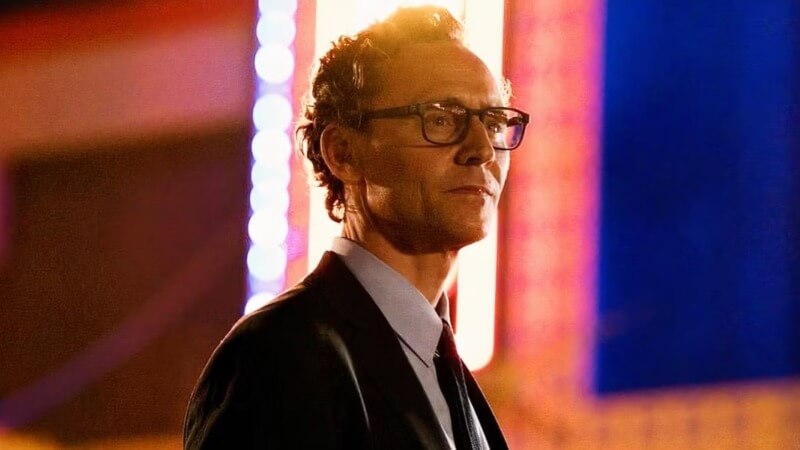The end is coming and it’s all anyone can talk about – at least that’s the case in The Life of Chuck, Mike Flanagan’s new take on another Stephen King short story. Roughly speaking, the movie charts Charles “Chuck” Krantz’s (Tom Hiddleston as an adult) life from its untimely end to rocky beginning. As he dies, slowly, on a narrow hospital bed, his end is projected on a wider, more existential canvas; wildfires ravage America’s food-producing states, California has all but floated into the sea after a series of disastrous earthquakes, and the internet is slowly shutting down, with the news arriving in explosive, gory chunks on static-ridden TV screens. Mysterious banners and billboards celebrating Chuck’s “39 years of service” are some of the only things left standing after sinkholes swallow much of The Life of Chuck’s fictionalized town. “Our man Krantz is the Oz of the apocalypse,” one of the characters observes.
All the while, Marty Anderson (Chiwitel Ejiofor), an English teacher at a public high school, and Felicia Gordon (Karen Gillan), a local nurse, strive to maintain coherence and logic in their life-giving professions despite the breakdown in social order. These ex-spouses fill the first 30 minutes of Flanagan’s film (or “Act 3: Thanks Chuck” as it’s called), and for both of them the facade of normalcy is slipping. Felicia sits shoulders to her ears, incapable of stemming the flow of suicides that are ravaging their hospital; Marty attempts to calm distracted parents who aren’t sure why they should bother educating children when the only business booming is undertaking. At the end of this long day, Felicia calls Marty with a glass of wine, to ask whether this is the end; “how much can we take before the whole thing falls apart?”
As a filmmaker, Flanagan has sought multiple ways to answer such an all-encompassing question. His The Haunting of Hill House miniseries follows the cursed Crain family, who are perpetually anchored to their traumatizing family home, his adaption of Gerald’s Game follows one woman’s fight for survival, slowly dredging up her childhood trauma in the process. All of his projects are about what happens when people reach their breaking point – and what can reasonably follow such a turn. In other words: When the boot drops, will what remains shatter or stay standing?
The Life of Chuck’s opening section is eerie and odd, and Flanagan seems to be twisting the normal structure of a post-apocalyptic story to offer something profoundly open-ended. It seems that for a second an American director is going to be brave enough to tackle human extinction with realistic honesty. The chasm of blue-black night swallows Felicia and Marty, who clutch hands as they watch the stars extinguish one-by-one and then with frightening rapidity. Will Frank’s article ‘Utopia of the Beautiful End’ echoes through this moment; “If this really is the end, few things could be more meaningful than taking action to avoid a dark end and bring about a beautiful one.”
Unfortunately, The Life of Chuck narrows rather than expands as it goes on, partly squandering this story of social collapse to explore one man’s quest for closure. This is aptly reflected in Flanagan’s filmmaking, which foregoes the wide, ambitious shots of a disheveled world found early on, for tight closeups of his characters in conversation. Really this final act (entitled “I contain multitudes” in reference to the Walt Whitman poem “Song of Myself,” which is recited at various points throughout) is almost entirely focused on a young orphaned Chuck, who lives with his grandparents (Mia Sara as Sarah and Mark Hamill as Albie) and must weather the loss that makes up life. It’s a fine story to tell, but the family structure it’s embedded in makes space for Flanagan’s trademark saccharine monologues. These monologues run the gamut, sometimes offering clarity (as with Nell’s speech in The Haunting of Hill House) and occasionally over-explaining Flanagan’s own intentions as a writer (as with the majority of Verna’s confrontations in The Fall of the House of Usher). For the most part, The Life of Chuck’s speechifying falls somewhere between — veering closer to the latter category. And as such, Chuck’s mysterious, final speech (to himself) falls flat; a formula repeated until it loses its flavor.
The Life of Chuck is an ambitious exploration of how to live in the shadow of certain death, but like the Mike Flanagan projects that have come before, it’s best when it pairs the humanism of his writing with a sense that something is ominously encroaching on the edge of our screens. Still, for a horror auteur (two, really, if you consider the author of the source material) this is a successful genre departure. If nothing else, The Life of Chuck proves that Flanagan’s control of tone and pacing extends to more than just ghost stories, infecting the rhythms of everyday drama with a haunting, heartfelt doom.
Director: Mike Flanagan
Writer: Mike Flanagan, Stephen King
Stars: Tom Hiddleston, Jacob Tremblay, Benjamin Pajak, Cody Flanagan, Chiwetel Ejiofor, Karen Gillan, Mia Sara, Mark Hamill, Carl Lumbly
Release date: June 6, 2025
London-based film writer Anna McKibbin loves digging into classic film stars and movie musicals. Find her on Twitter to see what she is currently obsessed with.
